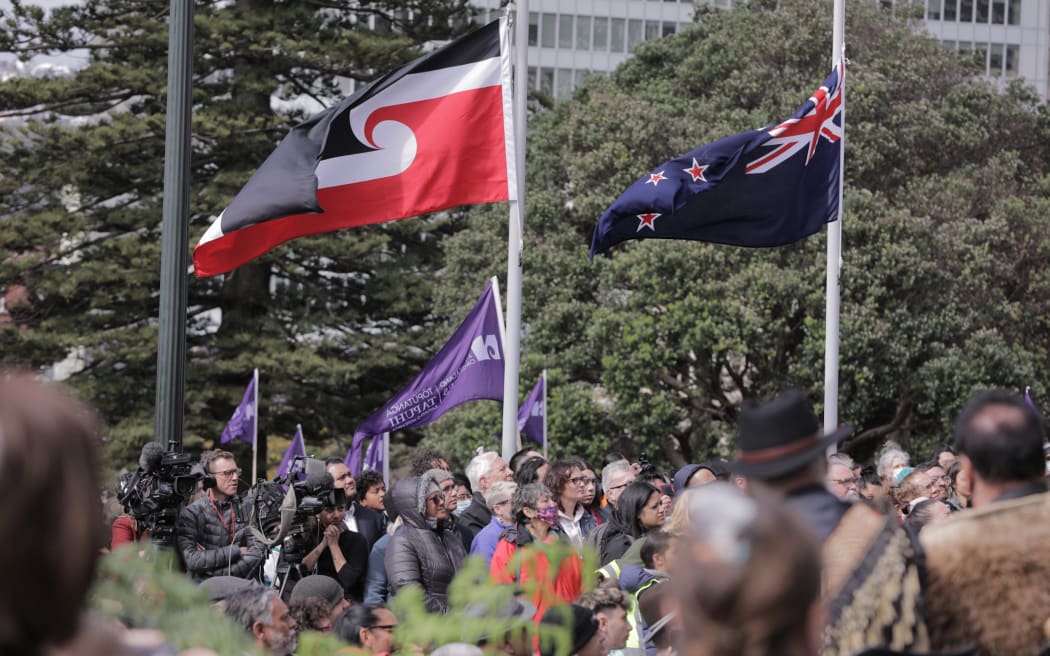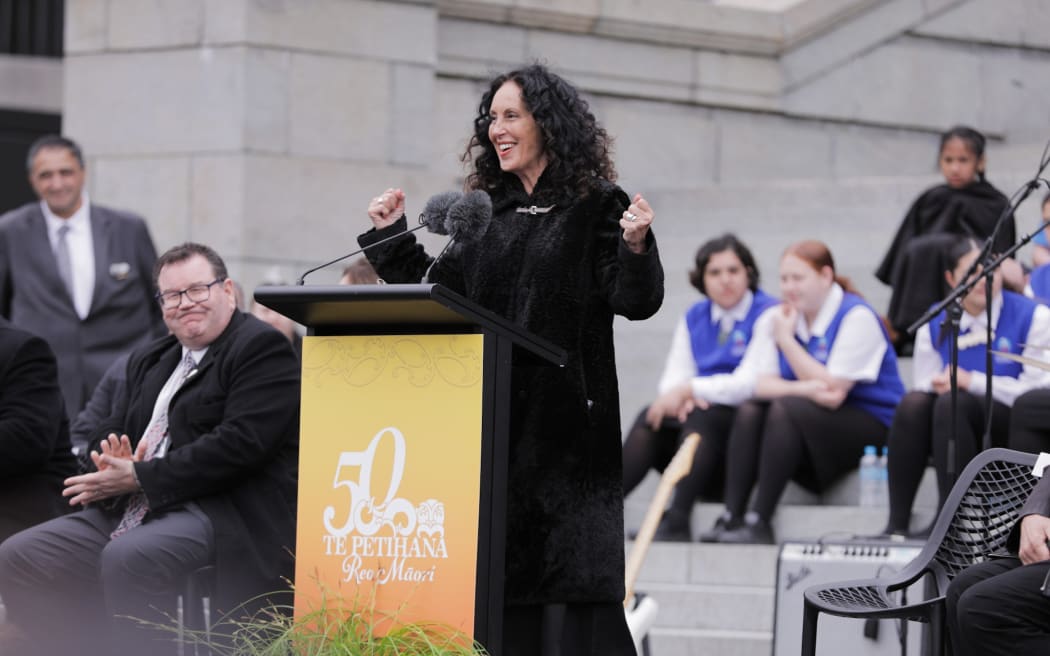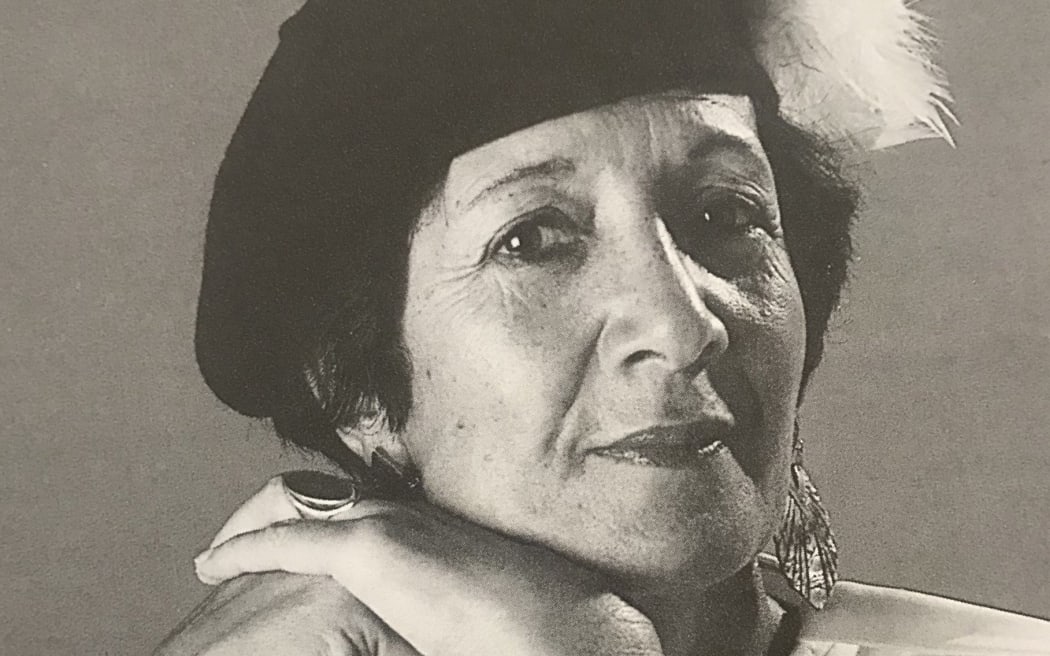
By Māni Dunlop, Māori news director, and Ashleigh McCaull of RNZ News
It has been a day of celebration and reflection for those who delivered the Māori Language petition exactly 50 years ago.
The day kicked off with a dawn ceremony at the National Library where mana whenua blessed an exhibition created in its honour.
The exhibition, named Tōku Reo, Tōku Ohooho – My Language Is My Awakening, included the petition itself, photos and videos.
Te Reo Māori Society member Dr Rob Pouwhare felt a mixture of emotions at the exhibition, including joy at how far the language had come.
“Things have advanced so quickly, so much is happening and I’m so thrilled that our kids are connecting with the language. Not just our kids, I see many New Zealand kids, Pākehā kids also connecting with the language,” Pouwhare said.
Māori Language Festival director Mere Boynton said it had been an emotional process.
“It is such a significant time for us and the petition is really the kaupapa, it’s essential, it’s the ngako of this hui ahurei and that’s the reason why mana whenua asked for a hui ahurei so that there was taonga that people could see,” Boynton said.

Contrasting scenes
Come midday there were contrasting scenes to what unfolded on the steps of Parliament in 1972, when the group including Ngā Tamatoa, Te Reo Māori society and Te Huinga Rangatahi, led by kaumātua Rev Hemi Potatau and Te Ouenuku Rene, delivered the 33,000-strong signed petition to MPs.
They were the champions from across the motu calling for the revitalisation of te reo Māori — and it was key moment in the reclamation.
But today — 50 years on — tino rangatiratanga flags flew on the forecourt, te reo Māori was heard throughout the crowd as thousands came together to reflect and remember the battle fought for the language.
Many in the crowd included kōhanga reo and kura kaupapa students — and other students and members of the public from near and far, young and old.
Those gathered on the stage and just in front included members of that ope that arrived there half a century with a goal — a goal to keep te reo Māori alive.
There were others of course who were not there — like the late like Hana Te Hemara who spearheaded the petition and its message — and those rangatira who led them but they were top of mind for all attending.
When RNZ asked Te Kura Kaupapa Māori o Te Raki Paewhenua year 11 students Marara and Kahurangi what they would think now, their response was, “I think they would be proud”.
‘Long way to go’
“But we still have a long way to go,”
That was a key sentiment of the day — reflecting on how far Aotearoa has come in 50 years but how far there still is to go in the revitalisation and now increase of the use of te reo Māori.

Rawiri Paratene, who stood with his daughter and Greens co-Leader Marama Davidson, was touched by the event.
“I’m proud to be part of it and great to see heaps of my mates and see them on the stage and they’re all fluent,” Paratene said.
Davidson said: “We’re all proud of my pāpā, my nana who was the generation who were traumatised to lose our reo and her love for her tamariki lives in us still.
“I’m proud that my dad was part of an amazing group of rangatahi. I can’t believe they were 18-17”.
Hana-Rawhiti Maipi-Clarke — a descendent of Hana Te Hemara, who handed over the petition — also spoke at the event.
Half a century later she had picked up the rakau and spoke of the wins Māori have had since then.

“Māori Health Authority, Māori wards, Matariki, kura kaupapa, kōhanga reo, Te Matatini. We’re even decolonising our blankets and chocolate,” Maipi-Clarke said.
‘Are you ready’ plea
She ended by asking the audience if they were ready.
“I’ll leave the decision with you whether you want to jump on our waka or not, because with or without you we will sail in both worlds.
“We’ve come so far but we’ve got so long to go. Let’s see what we can do in the next 50 years.”
Māori Language Commissioner Rawinia Higgins said it was up to the next generation to carry on strengthening the language.
“As much as we take for granted today the language and all the initiatives that have come out of the language, I think there’s so much more to do and it’s the young people,” Higgins said.
“So the young people brought this petition to parliament, it’s the young people who are here today celebrating that and hopefully find inspiration from all those unsung heroes.”
Supporters of te reo had come so far in that time — and those signatures had not gone to waste, she said.
She was encouraging rangatahi to speak with their grandparents about their fight to keep the language going with hopes it would be even stronger in another 50 years.
This article is republished under a community partnership agreement with RNZ.











































